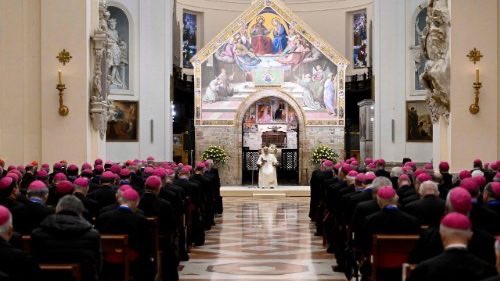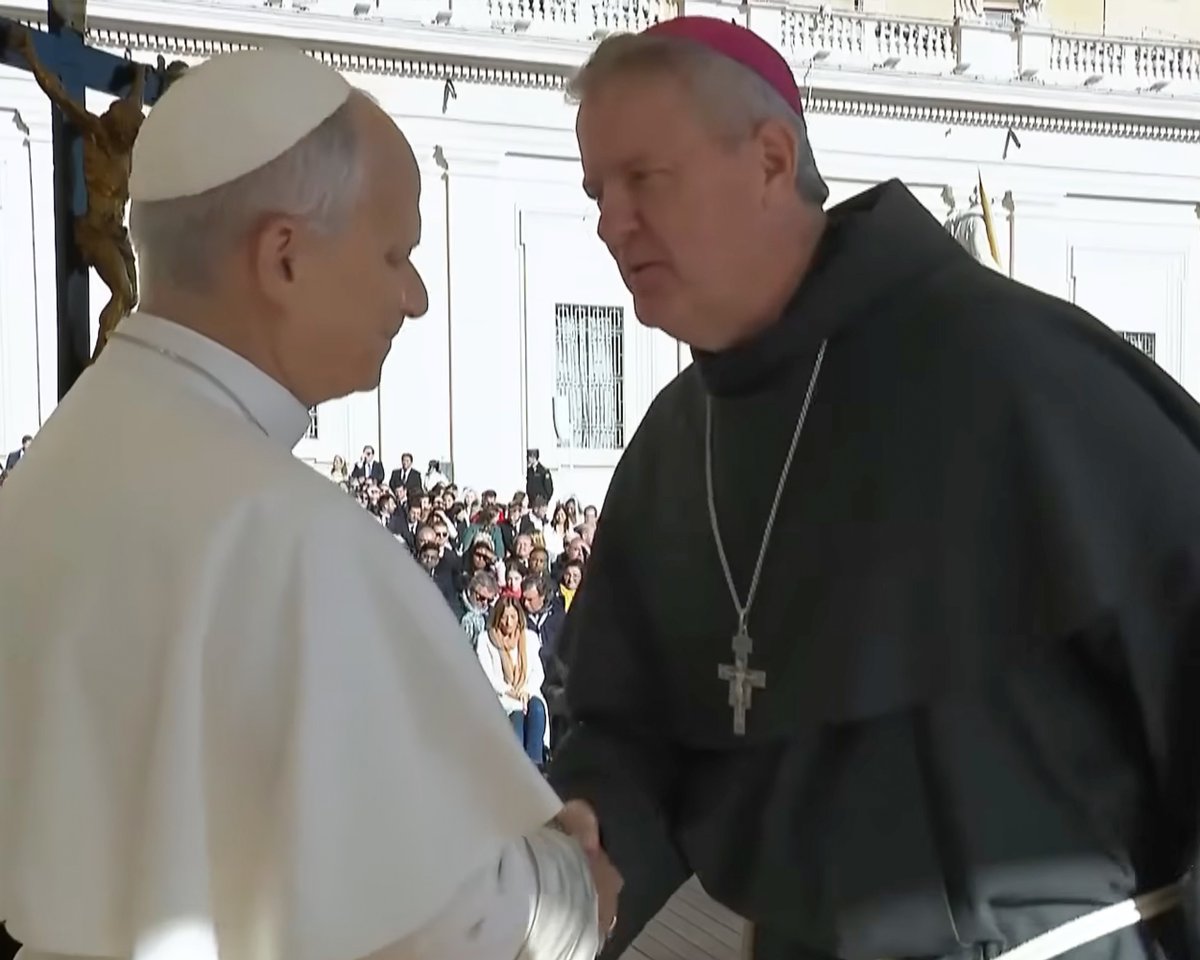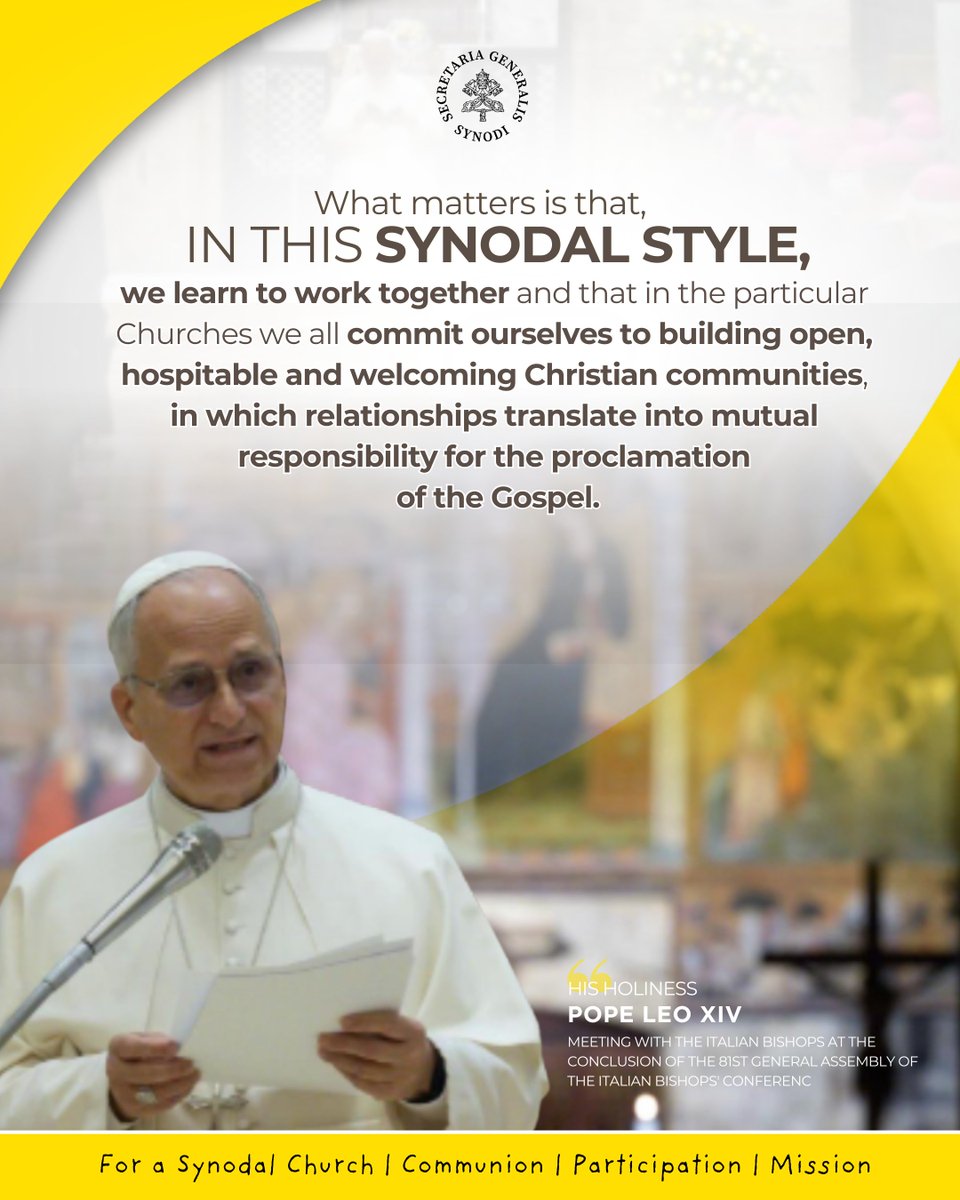Matthew 7:6 alert…
Speaking of Intercommunion: Why did Francis gift a Eucharistic Chalice to a Lutheran Pastor?
 © Vatican Media
© Vatican Media
Actions speak louder than words, and that is particularly true in the case of Jorge Bergoglio, the Argentinian apostate who has been starring as “Pope Francis” in the ongoing theological tragicomedy that is the Vatican II religion.
We only need to recall his happy reception of Italian abortion icon Emma Bonino, his acceptance of the invalid “blessing” of the Anglican Archlayman of Canterbury, or his blessing of the adulterous union of the Colombian president and his mistress. These actions say more than enough — no explanation needed.
The Intercommunion Controversy
With this in mind, consider the ongoing controversy over “intercommunion”, sometimes called “Eucharistic sharing” or “Eucharistic hospitality”. What is meant is the giving of (what is supposed to be) Catholic Holy Communion to baptized non-Catholics such as Lutherans or Orthodox, and vice versa.
This has been promoted and demanded especially by “Catholics” in the Land of Luther (Germany), on and off. The latest bout comes from the infamous “Synodal Way” (Synodaler Weg) currently in progress, as well as the “Ecumenical Church Conference” (Ökumenischer Kirchentag) that just took place.
The Italian Daily Compass reports:
In Germany open warfare is now being waged to break down the bastions of faith and doctrine. After the blessings to homosexuals and women “priests” preaching, it is now the turn of so-called intercommunion. The leaders of the Eucharistic committees take part in the Protestant Eucharistic Service and the Lutheran leaders in the Catholic Mass. Both approach their respective communions under the eyes of the Bishop of Limburg [Georg Bätzing].
(Luisella Scrosati, “German schism widens: Communion to Protestants”, Daily Compass, May 26, 2021)
Actually, the bastions of Faith and doctrine were dismantled a long time ago, and that order came from the top, beginning with John XXIII (1958-63) and the Second Vatican Council (1962-65). A certain Fr. Joseph Ratzinger (“Pope Emeritus” Benedict XVI) — another German — was particularly fond of the idea, echoing the call of the Swiss Modernist Fr. Hans Urs von Balthasar.
Why the accusation of schism against the German church? Schism is refusal of submission to the Roman Pontiff or of maintaining communion with the other members of the Church. Although Francis has said no to an intercommunion proposal before, things are not quite as simple as they may seem at first. The matter is, in fact, a bit complicated.
Let’s review.
In 2018, Francis officially rejected the German church’s intercommunion proposal. However, he did so only for reasons of prudence, such as bad timing and ecumenical sensitivities; he did not reject the possibility per se:
And why should he? The Second Vatican Council itself admits the practice in principle under the misleading cover of “sharing in the means of grace”, and the 1983 Code of Canon Law and the 1990 Code of Canons for the Eastern Churches enshrine it as church law. The 1993 Directory for the Application of Principles and Norms on Ecumenism applies the new law further, and “Pope” John Paul II‘s 2003 encyclical Ecclesia de Eucharistia confirms the practice and its theological foundation. All this is explained and documented here:
Since the possibility is thus admitted in principle in the Vatican II Church and “Eucharistic sharing” is no longer considered intrinsically wrong, the only issue that is left for Novus Ordos to disagree on is the precise circumstances that permit it. In essence, Francis could simply declare that the “signs of the times” are telling us that such sharing is now not only possible but commendable as a further impetus to that “Christian unity” to which the “Spirit” is calling us ever more urgently in our day. Perhaps he can even blame it on Coronavirus and say that COVID-19 “has shown us” this. You know, because “no one is saved alone” and stuff.
Since that might not fly with the conservatives in his sect, however, he may need to go the synodal route, where a whole bunch of Modernist pseudo-bishops do plenty of “discerning” and “listening to the People of God” before they declare what changes they want to see made. This might be more feasible for Bergoglio than simply pulling out the “god of surprises”, as he more or less did with the change on the death penalty.
Words and Actions: Francis at Rome’s Lutheran Church
Over the years, Bergoglio had given plenty of clues already as to his own personal attitude toward the question of intercommunion. The most visible came on Nov. 15, 2015, when Francis visited the Lutheran community of Rome by attending an ecumenical encounter at the Christuskirche (“Church of Christ”) hosted by its pastor, the German Jens-Martin Kruse.
At the end of the meeting, the two false shepherds exchanged gifts. Kruse gave Francis an Advent wreath. Francis gave Kruse a golden chalice and paten — the sacred instruments for offering the Holy Sacrifice of the Mass (which Lutherans deny and consider an abominable blasphemy):
At the end of the service, Pope Francis presented Pr. Kruse with a eucharistic chalice and paten; something he otherwise only does in visits to Roman Catholic dioceses. A remarkable sign! May this visit of the pope in a Lutheran church promote the cause of the ecumenical movement and touch many people!
(“Pope Francis at the Lutheran Church in Rome”, Institute for Ecumenical Research, no date given)
Remarkable indeed. The symbolism of the gift did not escape the Lutherans. Here is the full image of the occasion:
 © Vatican Media
© Vatican Media
Now what does a Lutheran do with such a present?
Lutherans don’t have Holy Mass, and even if they did, it would be the Holy Mass of a false religion, as with the Eastern Orthodox. What Lutherans do have, however, is a “Lord’s Supper” communion service. Either way it is clear that Francis’ gift will be used in the official worship of a false religion, specifically one which has a farcical communion service with bread and wine it claims fulfills the Lord’s command, “Do this for a commemoration of me” (Lk 22:19). What a blasphemy!
It is very important to understand that these considerations are objective. It can certainly be granted that many Lutherans are probably sincere in their errors and mean to render God pleasing worship, but that is simply irrelevant to the issue at hand. The point is that Lutheran worship is false external worship and as such it is objectively displeasing to God, indeed a grave sin against the very First Commandment, regardless of the internal dispositions of the people who participate in it:
God may be wrongly worshiped either by false worship or by superfluous worship being paid Him. Worship of God is false when its meaning is not in accordance with fact, or when the falsehood is in the person who performs the act of worship, as when a layman performs the duties of a priest, or when someone tries to gain credence for false miracles or false relics…. [F]alsehood in religion is a grave injury to God… Anything in the worship of God which does not tend to His honor and glory, or which is against the ordinances and practice of the Church, to whom the regulation of religious worship exclusively belongs, is superfluous worship and superstition.
(Fr. Thomas Slater, S.J., A Manual of Moral Theology, vol. 1, 3rd ed. [Benziger Brothers, 1908], pp. 215-216)
Someone might object that the chalice and paten in question had surely not been consecrated for Catholic use prior to being gifted, and that therefore there is no sacrilege. While that may be true as far as the sin of true and proper sacrilege is concerned, the larger issue remains: Francis is gifting liturgical items to Lutherans for use in their heretical worship and invalid Eucharistic services.
This action implies, at the very least, that their worship is valid and licit and objectively pleasing to God, which it definitely is not. The false pope is also thereby implicitly endorsing the entire Lutheran religion, or, worse still, the heresy of Indifferentism, “that false opinion which considers all religions to be more or less good and praiseworthy, since they all in different ways manifest and signify that sense which is inborn in us all, and by which we are led to God and to the obedient acknowledgment of His rule” (Pope Pius XI, Encyclical Mortalium Animos, n. 2).
Think we’re reading too much into this gesture? We’re not.
It was at that very Nov. 15, 2015 meeting that Francis was asked by a Lutheran woman about the possibility of “sharing the Lord’s Supper”. Bergoglio’s answer was a theological comedy show. Here is a video of the full exchange:
That was a masterpiece of an ambiguous answer and very typical for Francis. “Life is bigger than explanations” and “move forward” don’t say anything concrete, but they suffice to demonstrate that Francis is meaning to give permission without actually giving permission, and that is precisely his modus operandi because, as he likes to say, “realities are greater than ideas” (Exhortation Evangelii Gaudium, n. 231).
As always, Bergoglio wants it both ways. In theory, no, he cannot permit it; in practice, however, he wants to allow it. So he basically says, “Whatever. You figure it out. Pray and do whatever you think is best. It could be right for you. I won’t stop you.” This is subjectivism. It is also contrary to Our Lord’s admonition: “But let your speech be yea, yea: no, no: and that which is over and above these, is of evil” (Mt 5:37). We have commented on this at length elsewhere:
Anyone who is now tempted to long for the “good old days of John Paul II and Benedict XVI”, should keep in mind that what Francis did is essentially compatible with Vatican II and the post-conciliar magisterium. (In addition, Ratzinger bears the distinction of having ensured that a Vatican employee died a Lutheran.)
In fact, John Paul II’s 1993 Directory for the Application of Principles and Norms on Ecumenism, which is a veritable manual for implementing the ecumenism and ecclesiology of the council, states:
Catholic churches are consecrated or blessed buildings which have an important theological and liturgical significance for the Catholic community. They are therefore generally reserved for Catholic worship. However, if priests, ministers or communities not in full communion with the Catholic Church do not have a place or the liturgical objects necessary for celebrating worthily their religious ceremonies, the diocesan Bishop may allow them the use of a church or a Catholic building and also lend them what may be necessary for their services. Under similar circumstances, permission may be given to them for interment or for the celebration of services at Catholic cemeteries.
(Antipope John Paul II via Pontifical Council for Promoting Christian Unity, Directory for the Application of Principles and Norms on Ecumenism, nn. 137; underlining added.)
Here “St.” John Paul II legislates that it is not in and of itself wrong, but sometimes permissible and even laudable, to lend consecrated Catholic liturgical objects to heretics for their false worship!
This cannot be excused on the grounds that the Polish antipope restricts such use only to certain specific circumstances, because no circumstance can ever justify allowing heretics to use Catholic liturgical objects for their false worship! It is a sacrilege of colossal proportions!
Once again we see how the Vatican II religion differs from Roman Catholicism. Conciliar theology is not Catholic theology! What is a grave sacrilege before Vatican II cannot suddenly be a permitted and even commendable practice a few years later!
Catholic vs. Lutheran and Bergoglian Doctrine on the Eucharist
We must not forget that, in addition to not having a valid Eucharist, Lutherans also do not believe in Transubstantiation, which is a dogma all Catholics must profess under pain of heresy. Instead of the true doctrine, Lutherans believe in the heresy of Consubstantiation, also known as “impanation”, which holds that Christ is somehow present in the host alongside the bread, which remains bread, after the consecration.
So, beyond the question of sacramental validity, Lutherans and Catholics (even Novus Ordos) do not share the same doctrine about the Holy Eucharist. That means that they do not believe the same thing about what they are receiving in Holy Communion. On that point alone, the question of “Eucharistic sharing” is an utter absurdity.
The fact that in his answer to the Lutheran questioner Francis shamelessly relegates Catholic dogma (that of Transubstantiation) to the status of “explanations” and “interpretations” also demonstrates once more that he is not a Catholic but a Modernist. His remark is a more or less direct affirmation of the following error: “The dogmas which the Church professes as revealed are not truths fallen from heaven, but they are a kind of interpretation of religious facts, which the human mind by a laborious effort prepared for itself” (condemned in Pope St. Pius X, Decree Lamentabili Sane, n. 22; Denz. 2022).
It also runs afoul of Pope Pius VI’s condemnation of the errors of the Synod of Pistoia — which was itself a kind of regional Vatican II in the 18th century –, specifically the following one:
The doctrine of the synod, in that part in which, undertaking to explain the doctrine of faith in the rite of consecration, and disregarding the scholastic questions about the manner in which Christ is in the Eucharist, from which questions it exhorts priests performing the duty of teaching to refrain, it states the doctrine in these two propositions only: 1) after the consecration Christ is truly, really, substantially under the species; 2) then the whole substance of the bread and wine ceases, appearances only remaining; it (the doctrine) absolutely omits to make any mention of transubstantiation, or conversion of the whole substance of the bread into the body, and of the whole substance of the wine into the blood, which the Council of Trent defined as an article of faith, and which is contained in the solemn profession of faith; since by an indiscreet and suspicious omission of this sort knowledge is taken away both of an article pertaining to faith, and also of the word consecrated by the Church to protect the profession of it, as if it were a discussion of a merely scholastic question.
–dangerous, derogatory to the exposition of Catholic truth about the dogma of transubstantiation, favorable to heretics.
(Pope Pius VI, Apostolic Constitution Auctorem Fidei, n. 29; Denz. 1529)
Francis himself, it must be pointed out, has a very uneasy relationship, shall we say, with what he claims to believe is the Holy Eucharist (in almost all cases, the Novus Ordo Eucharist is actually invalid but the dogma of Transubstantiation is officially retained). Whereas he eagerly gets on his knees before people (think: politicians or prisoners, for instance), when it comes to kneeling before what is supposedly the Blessed Sacrament exposed in the Monstrance, his knees always give out. Not so, of course, when it’s time to go to confession and the HumbleCam™ is rolling. Some funny knees this man has!
With all that in mind, is it any surprise that Francis also has a problem with the dogma of Transubstantiation and instead tends to favor the — wait for it — Lutheran belief in Consubstantiation?
- “Jesus becomes Bread”, “God contained in a Piece of Bread”: Francis’ Lutheran Corpus Christi
- On Francis’ Denial of Transubstantiation: A Rejoinder to Dave Armstrong
Francis has long had a soft spot for Lutheranism, and that’s putting it mildly: “I like the Lutherans who follow the True Faith of Jesus Christ”, he told an audience in 2019. Last year he declared that baptized Lutherans are “members of one and the same mystical body of Christ”, and he happily admitted that he had once helped out a Lutheran pastor by leading his heretical prayer service in his stead. It is no wonder, then, that when a delegation of Lutherans from Finland visited the Vatican in 2016, they were given “Holy Communion”.
In light of all that, it looks like giving a Eucharistic chalice and paten to a Lutheran pastor is actually one of Bergoglio’s lesser offenses.
Image source: Servizio Fotografico Vaticano
License: rights-managed






No Comments
Be the first to start a conversation